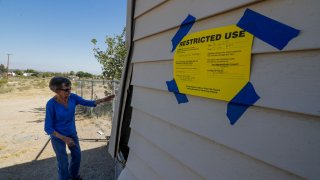
No matter where you live in California, there is a risk of considerable damage due to an earthquake.
Almost every Californian lives within 15 minutes of an active fault line. And many can still recall some of the strongest quakes to hit the state, from the widespread damage caused by the 1994 6.7 magnitude Northridge Earthquake to the building collapses from the Bay Area's Loma Prieta Earthquake.
So, state and federal agencies have a wealth of resources to help residents prepare for the inevitable next quake. Here is what you need to know before during and after the rumbling:
Photos: What to Keep in Your Disaster Emergency Kit
Emergency Alerts
The State of California has created a tool that can warn residents seconds before an earthquake strikes. That amount of time can be lifesaving, according to researchers.
The early warning system are pushed through a smartphone app called MyShake. The California Earthquake Early Warning Program works with the USGS to get ShakeAlerts sent to residents the moment researchers detect a quake over magnitude 5.0.
Local
Get Los Angeles's latest local news on crime, entertainment, weather, schools, COVID, cost of living and more. Here's your go-to source for today's LA news.
In addition, local municipalities have their own services to warn residents of a quake. In Los Angeles, the MyShake app replaced a previous warning app in 2021.
Before an Earthquake
The best thing you can do is to prepare for an earthquake ahead of time.
- Secure Your Space
Find items that will easily move during an earthquake. The state says to think about what would tousle if your home was turned on its side and secure those items. - Create a Disaster Plan
Some suggestions for your disaster plan include: how you will contact each other and deciding where your family will meet in case of an emergency; and making sure every member of your family knows how to turn the gas and electricity off. More information on disaster plans can be found here. - Organize Disaster Supplies
Your emergency kit should provide enough supplies to last your family three weeks -- food, water, clothing, personal care and other items. Also create a "grab-and-go" bag in case you need to quickly leave your home. Don't forget about supplies for your pets. - Ease Financial Hardship
Renters and homeowners should consider getting earthquake insurance and look into ways to increase the stability of your home. Create copies of your IDs and insurance records. Print photocopies of items in your home that will help when you file an insurance claim.
During an Earthquake
Of course, we all know that when the ground starts shaking to drop, cover and hold on. But what else should you do during the shaking?
- If you are in bed when an earthquake strikes, cover your head with a pillow and stay down. If you are outside, crawl toward an open space away from buildings, power lines and trees.
- If you are in need of immediate help, call 911. Contact 211 for less urgent matters.
- Once the shaking stops, evacuate your home. This may be the best chance to prevent further injury in case of an aftershock. Where possible, it may be better to evacuate on foot.
- Seek out an emergency shelter.
- An earthquake can also trigger a tsunami near the coast. If you're coastal, pay attention to the waves. If the water suddenly pulls away from the shore, a tsunami may be imminent. Search for higher ground. Find out if you are in a tsunami zone here.
- Lastly, register yourself as "safe and well" so people know you are OK.
After an Earthquake
Finally, there are several things to consider in the sometimes confusing and stressful moments after the shaking.
- Start to check on your home, but don't enter until you know it's safe.
- Check for gas leaks, chemical spills, broken water pipes or damaged electrical wires.
- Use your refrigerated food first and store canned goods for later. It may be hard to access supplies at stores following a quake.
- Contact your insurance company and begin taking photos of the damage.
- In the weeks following the quake, contact state and federal agencies like FEMA to inquire about federal assistance.
For more information visit these official resources:
- The United States Geological Survey (USGS) for the latest earthquake information within the U.S.
- Earthquake Country for tips on California's earthquake preparedness.
- MyHazards for what risks you're susceptible to.
- The California Earthquake Authority for insurance plans and home preparedness tips.
- Ready.gov for tips from the Department of Homeland Security on what to do in any type of emergency.
- The California Office of Emergency Services for emergency alerts
- Los Angeles' Emergency Management Department for alerts and information affecting the LA region



